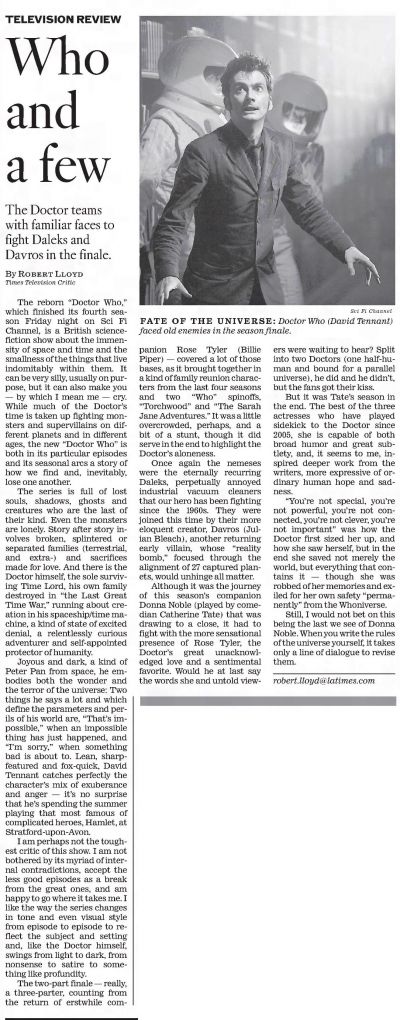Who and a few
- Publication: Los Angeles Times
- Date: 2008-08-02
- Author: Robert Lloyd
- Page: E8
- Language: English
The Doctor teams with familiar faces to fight Daleks and Davros in the finale.
The reborn "Doctor Who," which finished its fourth season Friday night on Sci Fi Channel, is a British science-fiction show about the immensity of space and time and the smallness of the things that live indomitably within them. It can be very silly, usually on purpose, but it can also make you — by which I mean me — cry. While much of the Doctor's time is taken up fighting monsters and supervillains on different planets and in different ages, the new "Doctor Who" is both in its particular episodes and its seasonal arcs a story of how we find and, inevitably, lose one another.
The series is full of lost souls, shadows, ghosts and creatures who are the last of their kind. Even the monsters are lonely. Story after story involves broken, splintered or separated families (terrestrial, and extra-) and sacrifices made for love. And there is the Doctor himself, the sole surviving Time Lord, his own family destroyed in "the Last Great Time War," running about creation in his spaceship/time machine, a kind of state of excited denial, a relentlessly curious adventurer and self-appointed protector of humanity.
Joyous and dark, a kind of Peter Pan from space, he embodies both the wonder and the terror of the universe: Two things he says a lot and which define the parameters and perils of his world are, "That's impossible," when an impossible thing has just happened, and "I'm sorry," when something bad is about to. Lean, sharp-featured and fox-quick, David Tennant catches perfectly the character's mix of exuberance and anger — it's no surprise that he's spending the summer playing that most famous of complicated heroes, Hamlet, at Stratford-upon-Avon.
I am perhaps not the toughest critic of this show. I am not bothered by its myriad of internal contradictions, accept the less good episodes as a break from the great ones, and am happy to go where it takes me. I like the way the series changes in tone and even visual style from episode to episode to reflect the subject and setting and, like the Doctor himself, swings from light to dark, from nonsense to satire to something like profundity.
The two-part finale — really, a three-parter, counting from the return of erstwhile companion Rose Tyler (Billie Piper) — covered a lot of those bases, as it brought together in a kind of family reunion characters from the last four seasons and two "Who" spinoffs, "Torchwood" and "The Sarah Jane Adventures." It was a little overcrowded, perhaps, and a bit of a stunt, though it did serve in the end to highlight the Doctor's aloneness.
Once again the nemeses were the eternally recurring Daleks, perpetually annoyed industrial vacuum cleaners that our hero has been fighting since the 1960s. They were joined this time by their more eloquent creator, Davros (Julian Bleach), another returning early villain, whose "reality bomb," focused through the alignment of 27 captured planets, would unhinge all matter.
Although it was the journey of this season's companion Donna Noble (played by comedian Catherine Tate) that was drawing to a close, it had to fight with the more sensational presence of Rose Tyler, the Doctor's great unacknowledged love and a sentimental favorite. Would he at last say the words she and untold viewers were waiting to hear? Split into two Doctors (one half-human and bound for a parallel universe), he did and he didn't, but the fans got their kiss.
But it was Tate's season in the end. The best of the three actresses who have played sidekick to the Doctor since 2005, she is capable of both broad humor and great subtlety, and, it seems to me, inspired deeper work from the writers, more expressive of ordinary human hope and sadness.
"You're not special, you're not powerful, you're not connected, you're not clever, you're not important" was how the Doctor first sized her up, and how she saw herself, but in the end she saved not merely the world, but everything that contains it — though she was robbed of her memories and exiled for her own safety "permanently" from the Whoniverse.
Still, I would not bet on this being the last we see of Donna Noble. When you write the rules of the universe yourself, it takes only a line of dialogue to revise them.
Caption: FATE OF THE UNIVERSE: Doctor Who (David Tennant) faced old enemies in the season finale.
Disclaimer: These citations are created on-the-fly using primitive parsing techniques. You should double-check all citations. Send feedback to whovian@cuttingsarchive.org
- APA 6th ed.: Lloyd, Robert (2008-08-02). Who and a few. Los Angeles Times p. E8.
- MLA 7th ed.: Lloyd, Robert. "Who and a few." Los Angeles Times [add city] 2008-08-02, E8. Print.
- Chicago 15th ed.: Lloyd, Robert. "Who and a few." Los Angeles Times, edition, sec., 2008-08-02
- Turabian: Lloyd, Robert. "Who and a few." Los Angeles Times, 2008-08-02, section, E8 edition.
- Wikipedia (this article): <ref>{{cite news| title=Who and a few | url=http://cuttingsarchive.org/index.php/Who_and_a_few | work=Los Angeles Times | pages=E8 | date=2008-08-02 | via=Doctor Who Cuttings Archive | accessdate=1 September 2024 }}</ref>
- Wikipedia (this page): <ref>{{cite web | title=Who and a few | url=http://cuttingsarchive.org/index.php/Who_and_a_few | work=Doctor Who Cuttings Archive | accessdate=1 September 2024}}</ref>
